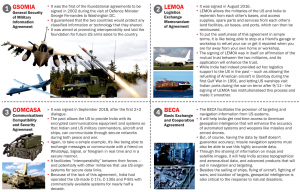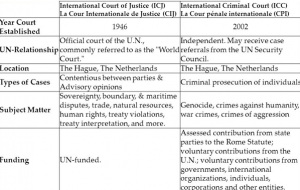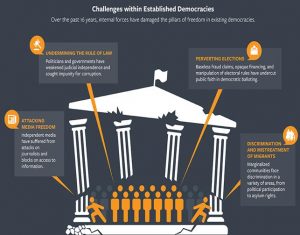Today’s Important Articles for Geography (03-03-2022)
Today’s Important Articles for Sociology (03-03-2022)
Today’s Important Articles for Pub Ad (03-03-2022)
WSDP Bulletin (03-03-2022)
(Newspapers, PIB and other important sources)
Prelim and Main
- N. General Assembly asks Russia to pull back troops READ MORE
- Exports up 22.36% to $33.81 billion in February; trade deficit widens to $21.19 billion READ MORE
- Explained: What constitutes a war crime? READ MORE
- India rated ‘partially free’ for second consecutive year in Freedom House report READ MORE
- At UN General Assembly, India Abstains From Resolution Criticising Russian Actions in Ukraine READ MORE
- Global food systems emissions alone can cause global warming to exceed 1.5°C: CSE report READ MORE
Main Exam
GS Paper- 1
- Key findings on Indian attitudes toward gender roles READ MORE
- Gender norms aren’t a monolith in India READ MORE
- Aging Concerns READ MORE
GS Paper- 2
POLITY AND GOVERNANCE
- Lines and roles: The time may have come for clarifyingthe role and functions of Governors READ MORE
- Rules for deputation of DIGs: what Centre proposes to change, and why READ MORE
SOCIAL ISSUES
- The post-pandemic crisis in schooling and higher education portends a grim future for India’s students, especially the poor READ MORE
INTERNATIONAL ISSUES
- In war-torn Ukraine, has international law failed us once again? READ MORE
- Will Russia’s war spur trade diversification? READ MORE
- How Russia’s invasion of Ukraine has undermined strategic choices available to India READ MORE
GS Paper- 3
ECONOMIC DEVELOPMENT
- Our green energy policy needs a close relook READ MORE
- IPO dilemma READ MORE
- Ukraine crisis could stall economic recovery READ MORE
- For India to measure poverty and achieve development goals, it needs a multipronged approach READ MORE
ENVIRONMENT AND ECOLOGY
- IPCC sounds another climate warning READ MORE
- What the New IPCC Climate Report Portends for India and South Asia READ MORE
- Climate, land use change threaten sustainable reindeer herding in the Arctic: IPCC Report READ MORE
SECURITY
- The history of the Kuki insurgency in Manipur READ MORE
GS Paper- 4
ETHICS EXAMPLES AND CASE STUDY
- An appetite for war but no place for peace: Millennia after Ashoka’s well-articulated moral discourse against war, the world is far from walking the talk READ MORE
- Key findings on Indian attitudes toward gender roles READ MORE
Questions for the MAIN exam
- To what extent, do you think that Russia’s invasion of Ukraine has undermined strategic choices available to India? Analyse your view.
- ‘Food production as a fundamental determinant of human well-being and progress faces a climate threat’. Discuss how India can minimize this threat.
- Discuss the relevance of Ashoka’s Dhamma in the present world.
QUOTATIONS AND CAPTIONS
- Millennia after Ashoka’s well-articulated moral discourse against war, the world is far from walking the talk.
- Far from addressing the situation, the NEP has been effectively sidelined.
- Green Hydrogen measures for cost reduction are welcome but much else could be done for India to achieve its larger goal.
- The so-called weakness of international law is a tale of the feebleness of global institutions and countries mandated to implement the law.
- The conflict between these two countries has wide-ranging ramifications on economic growth in India as well as other emerging economies.
- The old system provides social and economic security to employees; hence, the Rajasthan Govt decided to restore it in their larger interest.
- India to involve private players in a big way must ensure that future doctors are of international quality with Indian medical degrees. In sync with medical studies, the government’s budgetary spend on overall education too must go up significantly.
- Multidimensional poverty requires multidimensional indications and approaches. Therefore, only an administrative boundary-based approach ignoring the social group, natural resource dependency groups would be partial and ineffective in the last miles of target.
50-WORD TALK
- Union Minister Pralhad Joshi’s claim that 90% of Indians studying medicine abroad had failed NEET was tasteless — and wrong. NEET is a pre-requisite to study in many countries, although cut-offs are lower than in India. Students go abroad because India has historically failed to meet the demand for medical education.
- With India importing over 80% of its consumption, oil companies have no option but to raise prices of petrol, diesel and cooking gas. Otherwise, they could be saddled with huge under-recoveries on these products. Raising prices will inevitably fuel inflation, which has already touched 6%, the upper end of the band fixed by the RBI. The cascading impact of diesel prices, in particular, will fuel inflationary pressures.
Things to Remember:
- For prelims-related news try to understand the context of the news and relate with its concepts so that it will be easier for you to answer (or eliminate) from given options.
- Whenever any international place will be in news, you should do map work (marking those areas in maps and also exploring other geographical locations nearby including mountains, rivers, etc. same applies to the national places.)
- For economy-related news (banking, agriculture, etc.) you should focus on terms and how these are related to various economic aspects, for example, if inflation has been mentioned, try to relate with prevailing price rises, shortage of essential supplies, banking rates, etc.
- For main exam-related topics, you should focus on the various dimensions of the given topic, the most important topics which occur frequently and are important from the mains point of view will be covered in ED.
- Try to use the given content in your answer. Regular use of this content will bring more enrichment to your writing.
DAILY CURRENT AFFAIRS (MARCH 03, 2022)
THE INTERNATIONAL RELATIONS
1. 19TH EDITION OF INDIA-US MILITARY COOPERATION GROUP (MCG)
THE CONTEXT: The 19th edition of India-US Military Cooperation Group (MCG) meeting was held in Agra, Uttar Pradesh. The discussions focused on strengthening the ongoing defence engagements between the two sides and mulled on new initiatives under the ambit of existing cooperation mechanism.
THE EXPLANATION:
- The India-US MCG is a forum established to progress defence cooperation between the countries through regular talks at the strategic and operational levels between Headquarters, Integrated Defence Staff and the US Indo-Pacific Command.

- The strengthening of the mechanisms of cooperation between the two militaries must be seen in the context of an increasingly aggressive China, which threatens a large number of countries in its neighbourhood and beyond, and which has been challenging several established norms and aspects of international relations.
Background:
- Amid the ongoing standoff on the Line of Actual Control (LAC) in Ladakh — the longest and most serious in three decades — India and the US intensified under-the-radar intelligence and military cooperation at an unprecedented level, especially since June 2019.
- India signed four foundational agreements of US, and they are:
2. WHAT CONSTITUTES A WAR CRIME?
THE CONTEXT: The International Criminal Court has announced that it will open an investigation into possible war crimes committed by Russia in Ukraine. There are specific international standards for war crimes.
THE EXPLANATION:
Since Russia invaded Ukraine on February 24, its troops have increasingly hit civilian sites with airstrikes and artillery, raising concerns that war crimes are being committed.
Amnesty International said Russia’s military was conducting “indiscriminate attacks” in Ukraine.
And Ukrainian President Volodymyr Zelenskyy has described Russia’s missile strikes in civilian areas as war crimes, most recently, when the Russian army launched airstrikes on Kharkiv’s Freedom Square.
‘Laws of war’
- There are specific international standards for war crimes, which are not to be confused with crimes against humanity.
- War crimes are defined as serious violations of humanitarian laws during a conflict. The definition, established by the Rome Statute of the International Criminal Court (ICC) is derived from the 1949 Geneva Conventions and is based on the idea that individuals can be held liable for the actions of a state or its military.
The UN Office on Genocide Prevention and the Responsibility to Protect separates war crimes from genocide and crimes against humanity. War crimes are defined as occurring in a domestic conflict or a war between two states, while genocide and crimes against humanity can happen in peacetime or during the unilateral aggression of a military towards a group of unarmed people.
Distinction, proportionality, precaution
To decide whether an individual or a military has committed a war crime, international humanitarian law lays down three principles: distinction, proportionality and precaution.
- “The principle of distinction says that you have to be constantly trying to distinguish between civilian and belligerent populations and objects,” Kersten said, adding that this can be difficult.
“For example, attacking a barrack where there are people who have said they no longer participate in the conflict can be a war crime,” he said. “The same goes for bombing a military base where there are generators that supply hospitals with electricity.”
- The principle of Proportionality prohibits armies from responding to an attack with excessive violence. “If a soldier is killed, for example, you cannot bomb an entire city in retaliation”.
- The principle of Precaution requires parties to a conflict to avoid or minimize the harm done to the civilian population.
The Difference Between ICJ and ICC

About International Criminal Court:
- The International Criminal Court (ICC) investigates and, where warranted, tries individuals charged with the gravest crimes of concern to the international community: genocide, war crimes, crimes against humanity and the crime of aggression.
- The Court is participating in a global fight to end impunity, and through international criminal justice, the Court aims to hold those responsible accountable for their crimes and to help prevent these crimes from happening again.
- The Court cannot reach these goals alone. As a court of last resort, it seeks to complement, not replace, national Courts. Governed by an international treaty called the Rome Statute, the ICC is the world’s first permanent international criminal court
THE GOVERNMENT INITIATIVES/SCHEMES IN NEWS
3. OPERATION GANGA
THE CONTEXT: Amid tensions between Russia and Ukraine, Government of India launched ‘Operation Ganga’ initiative to bring back Indians stranded in Ukraine. Under this, India has already successfully brought back more than a 1,000 of its nationals from the country.
THE EXPLANATION:
- To ensure a safe evacuation of the stranded students, the Indian government has initiated ‘Operation Ganga’ to bring them home through alternate routes via Romania, Poland, Hungary and the Slovak Republic.
- Government also set up 24×7 control centres to assist in the evacuation of Indians through the border crossing points with Hungary, Poland, Romania and Slovak Republic. A Twitter handle, ‘OpGanga Helpline’, has also been dedicated to the mission, where all information regarding evacuation process and advisories of embassies are shared to keep everyone up to date.
- Air India, Indian Air Force- C17 Globe Master, Spice Jet, Indigo joined the mission of evacuation of Indians who are stranded in Ukraine.
Why Indians flock to Ukraine to study medicine
According to the Indian Embassy in Ukraine, 18,000 of a total population of 20,000-odd Indians in Ukraine are students pursuing medicine and engineering courses. These students are also the largest group of the 76,000 international students studying in Ukraine
Ukraine colleges – cheaper, viable alternatives to India
- Students who don’t get a seat in government medical colleges in India or are unable to afford the steep fees of private medical colleges, find better prospects in Ukrainian medical colleges, getting admissions to which are comparatively easier and cheaper.
- While the fee to study in private colleges in India may range between ₹60 lakh and ₹1 crore, pursuing a six-year course in medicine in Ukraine would cost ₹15-₹22 lakh and is affordable for middle class parents.
- There is no mandate to clear any entrance examination to get admitted to medical colleges in Ukraine. And the certification is accepted globally.
4. STREE MANORAKSHA PROJECT
THE CONTEXT: Union Ministry of Women and Child Development organised an event, in collaboration with NIMHANS, the “Stree Manoraksha project” as part of International Women’s Day week from 1st to 8th March.
THE EXPLANATION:
- The project is aimed at extending mental health training to 6000 OSC functionaries across India. Later in the day, in the afternoon session, a consultative conclave on capacity building of OSCs was organized in collaboration with NALSA. The event was attended by Government officials, representatives of NIMHANS, NALSA and the representatives of OSCs from across the country.
- The event highlighted the current developments in the country and the initiatives that have been implemented through MWCD for the safety, security and enhancing psychological wellbeing of women.
5. “SAGAR PARIKRAMA PROGRAM”
THE CONTEXT: On the occasion of 75th Azadi Ka Amrit Mahotsav, Ministry of Fisheries, Animal Husbandry and Dairying is going to launch a program “SAGAR PARIKRAMA” saluting our great freedom fighters, sailors and fishers.
THE EXPLANATION:
- The first leg of ‘Sagar Parikrama’ shall begin from Gujarat. Sagar Parikrama program is proposed to be celebrated in all coastal states/UT s through a pre-decided sea route down right from Gujarat, Diu, Maharashtra, Goa, Karnataka, Kerala, Tamil Nadu, Andhra Pradesh, Odisha, West Bengal, Andaman & Nicobar and Lakshadweep Islands to have interaction programme with fishermen, fisher communities and stakeholders in these locations and districts as a part of 75th “Azadi Ka Amrit Mahotsava” in order to know the problems of Coastal Fisher folk.
- It’s one of the significant initiatives of the Government of India to celebrate and commemorate 75 years of independence and the glorious history of its people, culture and achievements. An evolutionary journey is envisaged in the sea across the coastal belt demonstrating solidarity with all fisher folk, fish farmers and concerned stakeholder’s as a spirit of Aatma nirbhar Bharat.
- Government of India is in the forefront in transforming the fisheries sector and to formulate fisheries management plans along with regulatory framework towards effective fisheries governance to ensure sustainable and responsible development through an ecosystem approach. The journey of Sagar Parikrama shall focus on sustainable balance between the utilization of marine fisheries resources for food security of nation and livelihoods of coastal fisher communities and protection of marine ecosystems.
- The Country has a coastline of 8118km, covering 9 maritime States/4UTs and providing livelihood support to millions of coastal fisher folk.
THE MISCELLANEOUS
6. THE FREEDOM HOUSE REPORT
THE CONTEXT: India’s status remained as a “partially free” country for the second consecutive year in the annual report of Freedom House, a US government-funded non-profit that assesses the level of political rights and civil liberties across the globe.
THE REPORT HIGHLIGHTS:
- The Freedom House report has been published annually since 1973. It uses surveys and analysis to tabulate indices around freedom and human rights. India was rated as a “free” country in 2018, 2019 and 2020, but through the years, its scores and rank have fallen.
- The Pegasus spyware scandal, ‘love jihad’ laws, and death of adivasi rights activist Stan Swami in custody were some of the major factors cited by the report as the reasons for India’s ‘partially free’ status. The country’s total score also fell from ’67’ in 2021 to ’66’ in 2022 out of 100. The scores are similar to Malawi in southeastern Africa and South American nation Bolivia.
- The report noted that “the current instances of discriminatory policies that persecuted Muslims and hounded NGO, Journalists, activists are presided over by the right-wing
- The report also highlighted the government’s response towards farmers protesting against the three agriculture laws and Opposition leaders being “arrested” by the government while trying to visit Lakhimpur Kheri, where a minister’s car had allegedly hit protesting farmers.
- The harassment of journalists, non-governmental organisations and other government critics has “increased significantly”, while Muslims, Dalits and Adivasis “remain economically and socially marginalised”.
- The report also took note of the Covid-19 pandemic in India and the resultant Information Technology Act that restricted any content around poor handling of the health crisis.

THE PRELIMS PRACTICE QUESTIONS
QUESTIONS OF THE DAY 3rd MARCH 2022
Q. Consider the following statements about the International Criminal Court:
- It is the official court of United Nations.
- It handles the subject matters of Maritime disputes and trades.
- It headquartered at Hague.
Which of the statements given above is/are incorrect?
a) 1 only
b) 2 and 3 only
c) 1 and 3 only
d) 1, 2 and 3
ANSWER FOR 2nd MARCH 2022
Answer: C
Explanation:
Statement 1 is correct: These are Overseas Derivative Instruments that have Indian stocks as their underlying assets. They allow foreign investors to buy stocks listed on Indian exchanges without being registered.
Statement 2 is incorrect: These investments are considered as Foreign Institutional Investment (FII).
Statement 3 is correct: SEBI mandated that in addition to KYC, the anti-money laundering rules (AML) will also be applicable to P-Note holders.
Day-156 | Daily MCQs | UPSC Prelims | GEOGRAPHY
[WpProQuiz 171]